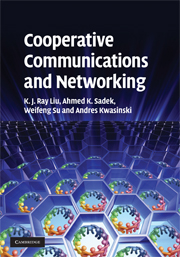Book contents
- Frontmatter
- Contents
- Preface
- Part I Background and MIMO systems
- Part II Cooperative communications
- 4 Relay channels and protocols
- 5 Cooperative communications with single relay
- 6 Multi-node cooperative communications
- 7 Distributed space–time and space–frequency coding
- 8 Relay selection: when to cooperate and with whom
- 9 Differential modulation for cooperative communications
- 10 Energy efficiency in cooperative sensor networks
- Part III Cooperative networking
- References
- Index
10 - Energy efficiency in cooperative sensor networks
from Part II - Cooperative communications
Published online by Cambridge University Press: 06 July 2010
- Frontmatter
- Contents
- Preface
- Part I Background and MIMO systems
- Part II Cooperative communications
- 4 Relay channels and protocols
- 5 Cooperative communications with single relay
- 6 Multi-node cooperative communications
- 7 Distributed space–time and space–frequency coding
- 8 Relay selection: when to cooperate and with whom
- 9 Differential modulation for cooperative communications
- 10 Energy efficiency in cooperative sensor networks
- Part III Cooperative networking
- References
- Index
Summary
In the previous chapters, the gains of cooperative diversity were established under the ideal model of negligible listening and computing power. In sensor networks, and depending on the type of motes used, the power consumed in receiving and processing may constitute a significant portion of the total consumed power. Cooperative diversity can provide gains in terms of savings in the required transmit power in order to achieve a certain performance requirement because of the spatial diversity it adds to the system. However, if one takes into account the extra processing and receiving power consumption at the relay and destination nodes required for cooperation, then there is obviously a tradeoff between the gains in the transmit power and the losses due to the receive and processing powers when applying cooperation. Hence, there is a tradeoff between the gains promised by cooperation, and this extra overhead in terms of the energy efficiency of the system should be taken into consideration in the design of the network.
In this chapter the gains of cooperation under this extra overhead are studied. Moreover, some practical system parameters, such as the power amplifier loss, the quality of service (QoS) required, the relay location, and the optimal number of relays, are considered. Two communications architectures are considered, direct transmission and cooperative transmission. The performance metric for comparison between the two architectures is the energy efficiency of the communication scheme.
Information
- Type
- Chapter
- Information
- Cooperative Communications and Networking , pp. 374 - 392Publisher: Cambridge University PressPrint publication year: 2008
